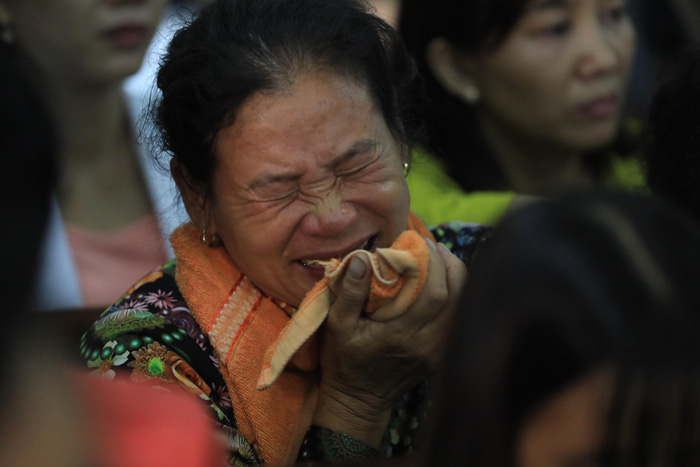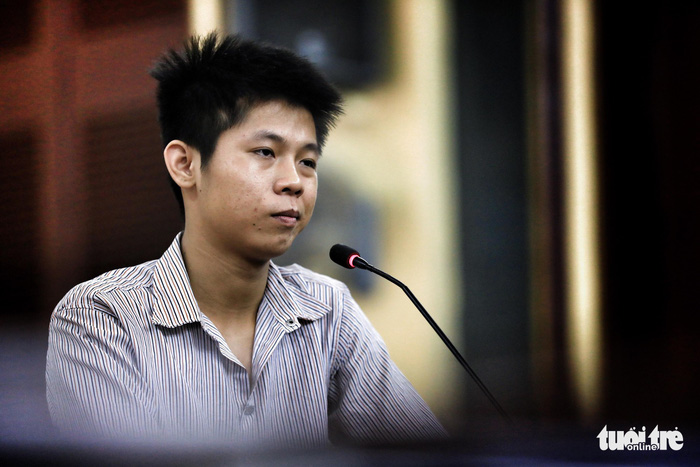A Vietnamese man who was sentenced to death on Monday by a court in Ho Chi Minh City for the February murder of a family of five said in his final words before the court that he wished to donate his organs to science after death.
Nguyen Huu Tinh had just turned 18 for less than a month when he committed the cold-blooded murder of five members in a family in Binh Tan District, Ho Chi Minh City, where he was employed as a worker.
In the early hours of February 13, 2018, Tinh, wielding a jackknife, one by one took the lives of his employers Mai Thi Hong, 37, and Mai Xuan Chinh, 46, before killing the couple’s three children aged 6-13 in their sleep.
Their bodies were not found until days later, when neighbors reported a foul smell to police officers.
Tinh was captured four days after committing the mass murder while on the run in Can Giuoc District in the southern province of Long An. He was charged with murder and robbery.
At the Ho Chi Minh City court on Monday, Tinh appeared unshaken by his actions as he smiled at the cameras and recounted the details of events leading up to that fateful February night.
 |
| Nguyen Huu Tinh smiles at the camera as he waits for the ruling on his case at a court in Ho Chi Minh City on July 9, 2018. Photo: Tuoi Tre |
Tinh said he had held a grudge against the house owners ever since he started working for the father’s stainless steel workshop in mid-2017 following a recommendation by an acquaintance.
He was regularly scolded for his laziness and game addiction, and was threatened to be laid off.
On the afternoon of February 12, which was three days from Vietnamese New Year according to the lunar calendar, the family held a year-end party with their friends and relatives, during which they loudly discussed how Tinh was lazy and slept a lot, according to his statement.
The harsh comments kept the 18-year-old boy awake all night.
As he was fidgeting around at 4:00 am the next morning, Tinh accidentally dropped a metal object on the floor, making a deafening noise that woke Mai Thi Hong, the mother, up.
Hong again told Tinh off, which was the last straw for him to unleash his fury on the house owner.
He stabbed her multiple times with a jackknife he had prepared beforehand until the woman was no longer moving.
 |
| Mai Thi Hien, sister of Mai Thi Hong, cries as she listens to details of her sister's murder at a court in Ho Chi Minh City on July 9, 2017. Photo: Tuoi Tre |
Tinh went on to murder her husband Mai Xuan Chinh out of fear that “he would attack me first,” he explained.
As for the couple’s three children, Tinh said he could not spare their lives because he was afraid they would report his murder to local authorities.
After massacring the entire family, Tinh stole a cellphone, a set of jewelry, a laptop and a motorbike before running away.
Judges found Tinh guilty of both murder and robbery and sentenced him to death due to the atrocity and cold-bloodedness of his actions.
He is also compelled to pay VND200 million (US$8,600) in compensation to the family of the victims.
“Mom and dad, I apologize for having no chance to return your love, now that I have to pay with my life for what I’ve done,” Tinh said to his parents as he was allowed to speak his final words at the court.
He added that he wished to donate his organs to science after death.
 |
| Nguyen Huu Tinh is escorted by police officers to a court in Ho Chi Minh City on July 9, 2018. Photo: Tuoi Tre |
However, legal experts consider the convict’s wish unfeasible, as there are no available laws concerning organ or body donation by death-row inmates.
According to Nguyen Hoang Phuc, deputy director of the Vietnam National Coordination Center for Human Organ Transplantation, death by lethal injection as used by Vietnam’s criminal justice system makes the body’s organs unusable for transplantation.
“Nevertheless, it is a humane wish by the convict that he would want his organs to be donated to science,” Phuc said.
Like us on Facebook or follow us on Twitter to get the latest news about Vietnam!






















































